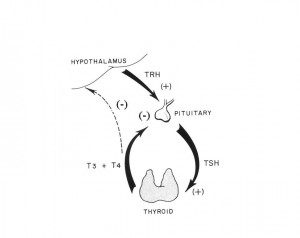What Does Your Thyroid Do?

The thyroid gland is related to the endocrine secretion and is situated at the base on the neck on the anterior side, in the area called “the Adam Apple” for men, same place for women, and close to the larynx and trachea. It has two lobes, which are connected and form a shape that looks very much like a small butterfly. This is the reason this gland to be often drawn as a butterfly on pictures and posters. Its name “thyroid” comes from the Greek word “thureoeidés”, meaning “shape like a shield”.
What is its structure and role of thyroid gland in the body system? What does your thyroid do?
Thyroid gland is specialized in hormone secretion, particularly two hormones: thyroxin and triiodothyronine (respectively T4 and T3). The only difference between these two hormones is the number of iodine molecules that they contain (respectively 3 molecules and 4 molecules of iodine). The production of these two hormones is practically managed by the production of TSH (Thyroid Stimulating Hormone) produced in the pituitary gland and the Thyrotropin-releasing Hormone (TRH), which is released by the hypothalamus. Both organs (hypothalamus and pituitary gland) serve as check points to detect whether or not the organism is getting enough thyroid hormone.

The quantity of T3, T4 and TSH are measured in blood tests to ensure the proper functioning of the thyroid gland and are indicator of the presence or absence of thyroid disorder. Once these hormones are released in the blood they further help the conversion of oxygen and calories into energy. Patients with too much thyroid hormones in the blood system (elevated T3 and T4 in blood tests) will experience higher conversion of calories into energy. Accordingly, they may eat large quantities of food, but because of the increased energy conversion they will lose weight. Quite the opposite, low levels of T3 may indicate low conversion of calories into energy and these people will feel fatigue and gain weight, regardless how little they eat.
The thyroid gland is estimated to secret about 80% of the thyroxin (T4) and 20% of the triiodothyronine (T3). However, the larger quantity of T4 (thyroxin) doesn’t mean that it is the more important hormone. In fact, the active hormone is T3 and some of the thyroxin (T4), through complex chemical processes, is converted to T3. The T3 and T4 thyroid hormones are manufactured from iodine (that comes from our food) and tyrosine through a complicated process of synthesis. They are responsible for the proper growth of the body and the different organs, and they also regulate many other body systems. The conversion of T4 into T3 actually does not happen in the thyroid gland, but in other organs and is connected with the hypothalamus. Thus, when discussing thyroid hormones and their optimal level it should be noted that hypothalamus and pituitary gland play an equal and sometimes even more important role in the whole endocrine process.
Respectively, when the thyroid produces too much thyroid hormone the condition is referred to as hyperthyroidism. When the thyroid gland produces not enough hormones, regardless of the reason, the condition is called hypothyroidism. In cases when the thyroid gland produces the optimal amount of thyroid hormones, the condition is referred to as “euthyroidism”, i.e. normal thyroid function.
What does your thyroid do during pregnancy?
During pregnancy, the level of T3 and T4 hormones increases significantly in order to cover the hormonal needs of the fetus, which is very important for its normal development. If pregnant women lack iodine in their diet that may influence the normal growth of the fetus, thus leading to improper development of its organs and even brain functions. Most of the newborn children are regularly screened upon birth for their levels of thyroid hormones. If insufficient amount of these hormones is detected, they could be treated for hypothyroidism to insure proper development.
